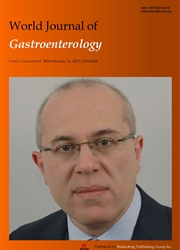

 中文摘要:
中文摘要:
AIM: To investigate the role of mi R-125 b in regulating monocyte immune responses induced by hepatitis C virus(HCV) core protein.METHODS: Monocytic THP-1 cells were treated with various concentrations of recombinant HCV core protein, and cytokines and mi R-125 b expression in these cells were analyzed. The requirement of Tolllike receptor 2(TLR2) or My D88 gene for HCV core protein-induced immune responses was determined by the transfection of THP-1 cells with gene knockdown vectors expressing either TLR2 si RNA or My D88 si RNA. The effect of mi R-125 b overexpression on TLR2/My D88 signaling was examined by transfecting THP-1 cells with mi R-125 b mimic RNA oligos.RESULTS: In response to HCV core protein stimulation, cytokine production was up-regulated and mi R-125 b expression was down-regulated in THP-1 cells. The modulatory effect of HCV core protein on cellular events was dose-dependent and required functional TLR2 or My D88 gene. Forced mi R-125 b expression abolished the HCV core protein-induced enhancement of tumor necrosis factor-α, interleukin(IL)-6, and IL-10 expression by 66%, 54%, and 66%, respectively(P < 0.001), by inhibiting My D88-mediated signaling, including phosphorylation of NF-k Bp65, ERK, and P38.CONCLUSION: The inverse correlation between mi R-125 b and cytokine expression after HCV core challenge suggests that mi R-125 b may negatively regulate HCVinduced immune responses by targeting TLR2/My D88 signaling in monocytes.
 英文摘要:
英文摘要:
AIM: To investigate the role of miR-125b in regulating monocyte immune responses induced by hepatitis C virus (HCV) core protein. METHODS: Monocytic THP-1 cells were treated with various concentrations of recombinant HCV core protein, and cytokines and miR-125b expression in these cells were analyzed. The requirement of Toll-like receptor 2 (TLR2) or MyD88 gene for HCV core protein-induced immune responses was determined by the transfection of THP-1 cells with gene knockdown vectors expressing either TLR2 siRNA or MyD88 siRNA. The effect of miR-125b overexpression on TLR2/MyD88 signaling was examined by transfecting THP-1 cells with miR-125b mimic RNA oligos. RESULTS: In response to HCV core protein stimulation, cytokine production was up-regulated and miR-125b expression was down-regulated in THP-1 cells. The modulatory effect of HCV core protein on cellular events was dose-dependent and required functional TLR2 or MyD88 gene. Forced miR-125b expression abolished the HCV core protein-induced enhancement of tumor necrosis factor-a, interleukin (IL)-6, and IL-10 expression by 66%, 54%, and 66%, respectively (P < 0.001), by inhibiting MyD88-mediated signaling, including phosphorylation of NF-kappa Bp65, ERK, and P38. CONCLUSION: The inverse correlation between miR-125b and cytokine expression after HCV core challenge suggests that miR-125b may negatively regulate HCV-induced immune responses by targeting TLR2/MyD88 signaling in monocytes.
 同期刊论文项目
同期刊论文项目
 同项目期刊论文
同项目期刊论文
 期刊信息
期刊信息
